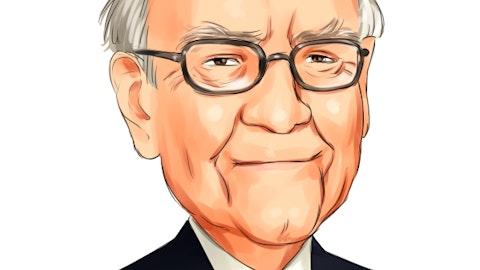Apple Inc (NASDAQ:AAPL) is a frustrating stock to own. You may ask: what do you mean good sir? I thought shares of the tech giant were up close to 70% (66.9%) since the start of the year? Do you mean to tell me that you are complaining about this massive price appreciation bestowed upon your portfolio?
Okay, unless you’re the offspring of a stock broker and an 18th century Englishman, that’s not exactly how the conversation would go, but that’s besides the point. The reason that owning Apple Inc (NASDAQ:AAPL) is annoying, is because every piece of coverage about the company is about the massive valuation that it has yet to reach. This writer has to admit, he is guilty of such gluttonous content; see “Here’s How Apple Can Get Past $1,000.”
Whether it’s the Cupertino-based company’s potential deal with the biggest cell carrier in the world, China Mobile Ltd. (NYSE:CHL), or its bright earnings outlook on the heels of the iPhone 5’s release, the reasons to be bullish on Apple Inc (NASDAQ:AAPL) are plentiful. Did we mention that it looks to be undervalued based on nearly every known metric under the sun? Look no further than this article to point these facts out.
Interestingly, this week’s trading activity has thrown a kink in the stock’s brief stint above the $700 mark, and at the time of this writing, shares are hovering around $680 a share. By the conclusion of most analysts, Apple’s decline over the past few weeks is likely due to: (1) a shortage of iPhone 5 screens in production, (2) numerous customer complaints about erroneous advice from the iOS 6’s new map app, and (3) issues with iPhones being scratched upon delivery in a “conspiracy” known on Twitter as #scuffgate.
What all of these issues have in common is that they are decidedly short term in nature, immaterial to the company’s growth prospects 1, 5, 10 years down the line.
Conversely, what if some of this selloff was due to something less obvious, and more fundamentally detrimental to Apple Inc (NASDAQ:AAPL)’s future prosperity? Because we at Insider Monkey like to cover both sides of an argument, let’s discuss a few reasons how the bears’ cries of doom and gloom could actually be correct.
1) Tim Cook may not be the successor we thought he was.
Tim Cook is the highest paid head honcho in history, according to the Wall Street Journal’s 2011 survey of annual CEO earnings. Cook made $376.2 million last year, though most of this wealth is tied to the price of Apple Inc (NASDAQ:AAPL)’s stock, which he can begin selling in 2016. It is ludicrous to argue that Cook does not have the motive to keep his company on the righteous path that Steve Jobs originally laid out. The real concern is that he is simply unable to follow in his mentor’s footsteps.
As a clever man once said: “does a ship sink if it loses its captain?”, which most will emphatically reply “NO.” After all, Apple Inc (NASDAQ:AAPL) is perfectly set up for its next decade of technological domination, with legions of loyal fans and a product line that cross-integrates nearly every feature it has. Looking at this seemingly obvious question again, however, raises some concerns. It’s likely that small minority of contrarians will respond with “a captain-less ship won’t sink per say, but it will float aimlessly in the sea, eventually losing its direction.”
While this maritime metaphor about Apple Inc (NASDAQ:AAPL) is a bit silly, it does seem to hit the nail on the head. After Steve Jobs’s passing last fall, most thought that Cook’s position as the iconoclast’s right-hand man for the better part of a decade had adequately prepared him for succession. Looking at the company’s developments, from the iPhone 5 to reports of an iPad Mini that have occurred over the past year, we can see that this may have not been the case, which brings us to our next point.
2) Apple’s inclusion of a faulty iMaps app may be a harbinger of bigger problems down the road.
As we wrote last week, Apple’s new mapping application for the iPhone 5 (and older phones electing to upgrade to iOS 6) has received some scathing reviews out of the gate. Whether it’s stories of über popular destinations like DC’s Dulles Airport or the curious case of a missing Jerusalem, it appears that Apple Inc (NASDAQ:AAPL)’s new system is not as accurate as Google Maps. Considering the fact that Cook and Co. decided to dump the popular program as a built-in app on its new phone, these reports are troubling to say the least.
As one prominent Apple Inc (AAPL) exec has stated: “Maps is a cloud-based solution and the more people use it, the better it will get.” Gee…shouldn’t the company’s first full-scale foray into Google’s territory have been, well, flawless? Raise your hand if you think Steve Jobs, who is widely known as the greatest perfectionist to ever walk through the tech industry, might not have been okay with a haphazard introduction of any product, let alone one dominated by his company’s chief rival.
3) The same can be said about the company’s iPad Mini.
This one is easy, plain and simple. In Apple’s fourth quarter earnings call in 2010, Jobs gave a lengthy rant over the perils of 7″ tablets, stating that they’re “too big to compete with a smartphone and too small to compete with the iPad.” During the Q&A portion of the call, Jobs also said these products “are going to be DOA — dead on arrival.” It appears that the former Apple Inc (NASDAQ:AAPL) CEO’s main concerns with miniature sized tablets was that their screens would be too small to provide the breadth of features that iPad-lovers were so used to.
These comments haven’t stopped the post-Jobs Apple Inc (NASDAQ:AAPL) from developing an iPad Mini, rumored to be announced next month. Early estimates predict the tablet will have a price point at or below $299, to prevent it from completely cannibalizing the company’s third generation iPad. The exact effect that a smaller iPad may have on existing tablet sales is only speculation at this point, but it’s worth pointing out that many Apple analysts, including Topeka Capital Markets, believe it could affect “10-20 percent” of the company’s existing top line.
While the Samsung trial has given us insight into internal emails that discuss Jobs’s “receptiveness” to such a product, this is looks like e-heresay, and should be taken for little more than that. We’ll choose to believe the words actually spoken by the man, pre-humous.
The point is this: Steve Jobs was against the idea of an iPad Mini not only because of its questionable functionality, but more importantly, because it wouldn’t create its own market, separate from those occupied by iPhone and iPad users. An iPad Mini looks to be simply a rehashed version of an already successful product, not something that is truly groundbreaking. Likewise, the words “iPad Mini” could be replaced with iPhone 5 in this sentence, and its meaning would be all the same. Until Tim Cook can deliver a product that is truly worthy of his mentor’s legacy, bears can continue to be concerned about the company’s innovativeness going forward.
4) Partners no longer want to play by the “Steve Jobs Rules” anymore.
As we originally discussed in our exploration of Apple’s potential valuation, the company is primed for a deal with China Mobile, which has 700 million subscribers ripe for the picking. One potential hiccup over such an agreement, however, is the carrier’s refusal to play by the so-called Steve Jobs Rules. According to Ubergizmo, China Mobile “has requested that Apple Inc (NASDAQ:AAPL) give them a cut of the sales from the iTunes App Store,” a move which the company is understandably hesitant to make. In Jobs’s time as CEO, he was particularly skilled at maneuvering his way around partners’ demands. Historically speaking, Apple Inc (NASDAQ:AAPL) has not given even small portions of their sales to strategic partners, and a reversal of this strategy may set a less profitable precedent going forward.
5) In terms of book value, Apple’s shares are actually more expensive than Google or Microsoft.
While they do look attractive from an earnings and cash flow standpoint, shares of Apple Inc (NASDAQ:AAPL) are actually overvalued when using the price-to-book ratio. With a P/B of 5.6X, this metric indicates that the company is trading at a 10% premium to the computer systems industry’s average (5.1X). This overvaluation is stretched even further when looking at competitors like Google Inc (NASDAQ:GOOG), Microsoft Corporation (NASDAQ:MSFT), and Hewlett-Packard Company (NYSE:HPQ), which all trade at book multiples below 4. It’s notable that Apple’s current book valuation is the highest it has been since June of 2008, when shares traded at 7.5 times net assets. In the fifteen months following this peak, shares of Apple Inc (NASDAQ:AAPL) remained flat.
What does the hedge fund industry think?
Finally, it’s worth mentioning the hedge fund industry’s interest in Apple Inc (NASDAQ:AAPL). As discussed in our list of “5 stocks billionaires are crazy about,” Apple is the most popular stock among the richest fund managers. Over 40% of the billionaires we track had positions in the company at the end of June. Interestingly, the stock’s popularity amongst the world’s most successful money managers has not stopped bears like Philippe Jabre’s Jabre Capital Partners from buying a massive amount of put options over this same time. Other Apple contrarians include Ray Dalio (see Dalio’s full 13F portfolio here) and Bain Capital’s Brookside Capital, who have closed out their positions in the stock over the past year. Here’s a full look at hedge funds’ interest in Apple.
In short, we’re not recommending that any investor holding shares of Apple Inc (NASDAQ:AAPL) should dump them, but they should at least ask themselves this question: is the company on the same path to prosperity that it was when Steve Jobs was CEO? If the answer to that question is “no,” then it may be useful to at least temper expectations over the long run. In the race to a market capitalization of $1 trillion, there may be better options to look into.
Disclosure: No positions in Apple Inc (NASDAQ:AAPL) or any other stock mentioned in the article.






